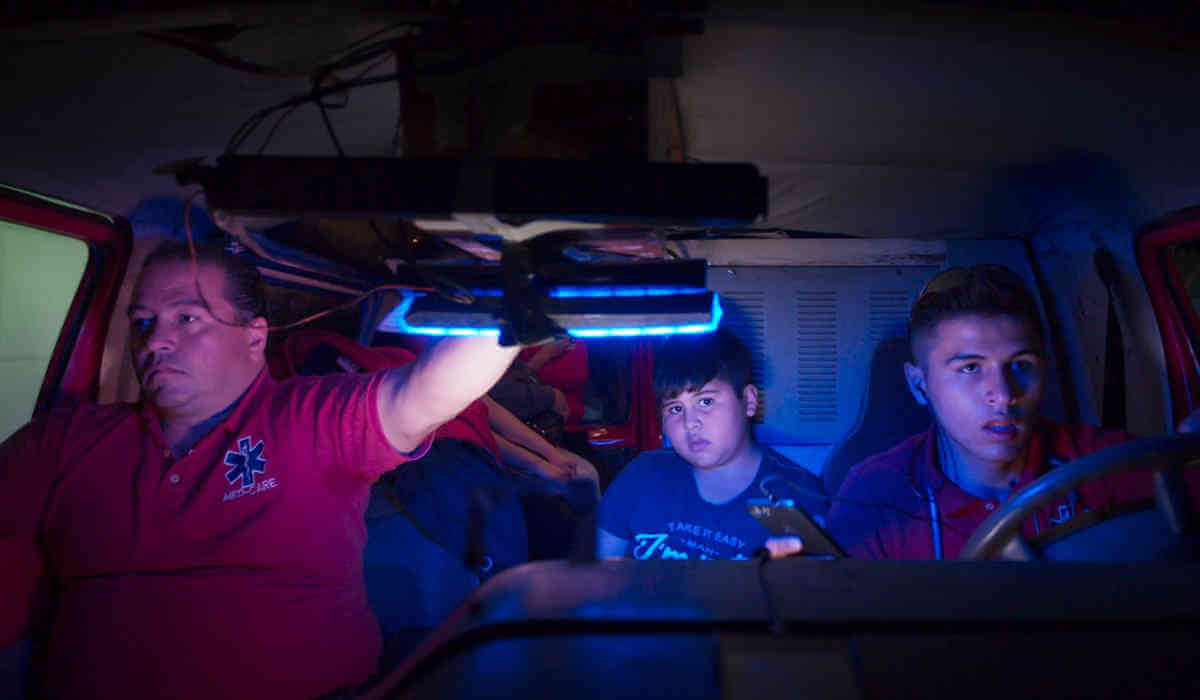The person who first applied the phrase “ambulance chasers” to lawyers didn’t envision a world where ambulances chase each other to get to injured people. In Mexico City, the government operates less than 45 ambulances, even though nine million people live there. Thus, private business is left to pick up the slack. Indeed, as the ambulances race in the streets, they risk crashing and causing further injuries.
“Midnight Family,” made by US director Luke Lorentzen over a six-month period, shows the dangers. He profiles the Ochoa family, who operate their own ambulance. While they start off meaning well, they operate in an exploitative system that results in them asking desperate people for money to get a ride to the hospital. Over the film’s brief 80 minutes, it stages a drama in which the family becomes increasingly amoral in their pursuit of money, without doing more than getting by.
“Midnight Family” avoids the perils of a tabloid aesthetic. With one exception, Lorentzen keeps the faces of the Ochoas’ passengers offscreen. When they pick up a teenage girl who has been beaten by her boyfriend, her face is shown in profile. (One wonders how he was able to accomplish such careful framing under tight and difficult conditions.) Given the subject matter, it’s impossible to avoid showing blood, but “Midnight Family” refuses to dwell on it. This isn’t a wallow in gore and misery.
Lorentzen’s gaze is empathetic, not pornographic. While the pain of the people who need an ambulance comes across, the film respects their privacy and dignity. In North American culture, Mexico is too frequently reduced to clichés about drugs and violence; while the subject matter might offer an opportunity to do the same here, “Midnight Family” dodges it.
Women don’t play much of a role in “Midnight Family” except as injured passengers. The Ochoa family consists of an adult man named Fer, his teenage son Juan, and his nine-year-old son Josué. They spend every night speeding around the streets of Mexico City. Their work involves a degree of racing adrenaline, and “Midnight Family” does evoke its ebb and flow as the Ochoas yell at their rivals while rushing around Mexico City. Josué bounces a soccer ball while sitting in the ambulance as his father drives around.
They serve the city’s wealthiest neighborhoods, hoping to find better-paying clients there. The tension between their own meager livelihood and their interactions with people who may be well-off financially but suffering physically runs throughout the film.
The ambulance’s blue and red lights become the film’s illumination. “Midnight Family” is filled with an offhand beauty. Lorentzen walks a fine line. He shaped a narrative out of a long period of time with the Ochoas, effacing his own presence. Given the cramped space of the ambulance, where Fer and Juan often sleep, he must’ve been ducking out of their way much of the time. There are some remarkably tight camera angles. The Ochoas seem to have grown remarkably comfortable with him sitting alongside in such fraught and tense situations.
“Midnight Family” falls into the cinema vérité tradition. Lorentzen never interviews the Ochoas (or anyone else). He eschews voice-over. There’s no overt editorializing. At times, it evokes Frederick Wiseman’s “Hospital” and “Domestic Violence.” But it has a clear political point of view, indicting the Mexican government’s failure to provide adequate medical care for its people. And while that’s bad enough, it’s led to a commodification of the most basic services and an unhealthy competition. The corruption of the police contributes to making this situation worse. This is reality, not a metaphor, but in Mexico it doesn’t just describe health care.
MIDNIGHT FAMILY | Directed by Luke Lorentzen | In Spanish with English subtitles | 1091 | Opens Dec. 6 | Metrograph, 7 Ludlow St., btwn. Canal & Hester Sts.; metrograph.com



































